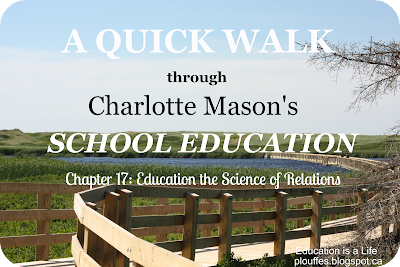This blog post is part of an on-going daily series this month as I read (very quickly) through School Education by Charlotte Mason. Join me! Pick up your book and read a chapter, or find it free online at Ambleside Online.
Summary
In these three chapters, Charlotte Mason uses autobiographical works "The Prelude" by William Wordsworth and Praeterita by John Ruskin to illustrate how education is the science of relations.
Because children are born persons, we are limited to the use of three external instruments of education: atmosphere, discipline, and life. Any other instrument would encroach on the child's personality by playing on his vanity, or his love, or his desire to please, or even his fears. Even atmosphere, discipline, and life are limited by our respect for them as persons: we do not manipulate their environment to shield them too much from real life, and we help them develop habits in the context of real life.
Education is the science of relations: "we personally have relations with all that there is in the present, all that there has been in the past, and all that there will be in the future--with all above us and all about us--and that fulness of living, expansion, expression, and serviceableness, for each of us, depend upon how far we apprehend these relationships and how many of them we lay hold of." (p. 186) In education, our role as parents and teachers is "to remove obstructions and to give stimulus and guidance to the child who is trying to get into touch with the universe of things and thoughts which belong to him." (p. 188)
Neither Wordsworth nor Ruskin had perfect educations, but the ideas that took hold of them and bore fruit in their lives were the result of their intimacies. Charlotte Mason gives examples from Ruskin of how he handled and made with material objects, from Wordsworth of his intimacy with wildflowers, from both of their love of books by specific authors. There were limitations in the educations of each of them, but their autobiographical works show how children latch on to "their proper affinities" when they are given the opportunity to do so.
Education as the science of relations should not be seen as an excuse to be lazy or unintentional in our schooling. Strenuous effort has to be put into making these relationships. Often this effort is made for the joy of it, but it is work all the same. Quiet, steady, daily effort is more conducive to "Captain ideas" than taking random special opportunities to learn.
Quotes
"habits, ideas, and circumstances are external, and we may all help each other to get the best that is to be had of these; but we may not meddle directly with the personality of child or man." (p. 183)
"All I would urge is a natural treatment of children, and that they be allowed their fair share of life, such as it is; prudence and not panic should rule our conduct towards them." (p. 185)
"habits, whether helpful or hindering, only come into play occasionally, while a great deal of spontaneous living is always going on towards which we can do no more than drop in vital ideas as opportunity occurs." (p. 185)
"Our deadly error is to suppose that we are his showman to the universe; and, not only so, but that there is no community at all between child and universe unless such as we choose to set up." (p. 188)
"It is enough for the present if they have shown us in what manner children attach themselves to their proper affinities, given opportunity and liberty. Our part is to drop occasion freely in the way, whether in school or at home. Children should have relations with earth and water, should run and leap, ride and swim, should establish the relation of maker to material in as many kinds as may be; should have dear and intimate relations with persons, through present intercourse, through tale or poem, picture or statue; through flint arrow-head or modern motor-car: beast and bird, herb and tree, they must have familiar acquaintance with. Other peoples and their languages must not be strange to them. Above all they should find that most intimate and highest of all Relationships,--the fulfilment of their being." (p. 209)
"We must get rid of the notion that to learn the 'three R's' or the Latin grammar well, a child should learn these and nothing else. It is as true for children as for ourselves that, the wider the range of interests, the more intelligent is the apprehension of each." (p. 209)
(quoting Sir Walter Scott in Waverley:) "Alas, while he was thus permitted to read only for the gratification of his amusement, he foresaw not that he was losing for ever the opportunity of acquiring habits of firm and assiduous application, of gaining the art of controlling, directing, and concentrating the powers of his mind for earnest investigation--an art far more essential than even that intimate acquaintance with classical learning which is the primary object of study." (p. 210)
"we cannot catch hold of any one of the affinities that are in waiting for us without strenuous effort and without reverence." (p. 211)
